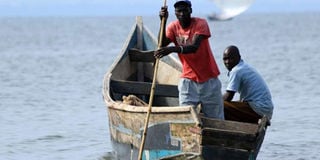East African countries urged to end illegal fishing in Lake Victoria

Fishermen go about their business in Lake Victoria in Kisumu on September 29, 2016. PHOTO | TONNY OMONDI
What you need to know:
- Cabinet Secretary for Water and Mining Eugene Wamalwa asked the states to tighten the common environment protection laws to ensure that issues affecting the basin are addressed.
The five countries bordering Lake Victoria have been asked to end illegal fishing and discharge of industrial waste into the lake if they must benefit from the resource.
The sectorial council of ministers (Secom) from Kenya, Uganda, Rwanda, Tanzania and Burundi said destruction of forest cover and use of poor agricultural methods had led to silting that has destabilised the waters.
This has held back the great economic benefits that come with activities like fishing which is relied on by millions of people across the riparian states.
The ministers spoke on Thursday during an event to celebrate the 10th year since the Lake Victoria Basin Commission (LVBC) was instituted by the East African Community to protect and steer development agendas in the lake basin.
“We should think seriously of ending destruction of watersheds, channelling of wastes from industries, farms and mines and controlling soil erosion,” Engineer Ramo Makani, the Secom chairman for LVBC
Mr Ramo who is also Tanzania’s deputy minister for natural resources said it was the duty of every member state to protect the water levels and end use of illegal fishing gears that that have destroyed fish breeding grounds therefore reducing their numbers in the waters.
Kenyan cabinet Secretary for Water and Mining Eugene Wamalwa and LVBC Executive Secretary Dr Said Matano asked the states to tighten the common environment protection laws to ensure that issues affecting the basin are addressed.
“Secom plays an important role in providing policy direction and oversight on issues affecting the lake basin. This is an opportunity to address challenges the development of the basin and improvement of our people’s livelihoods,” said Mr Wamalwa.
Dr Matano said the commission has made a milestone in conservation of the ecosystem, removal and management of the stubborn water weed, hyacinth, as well as controlling disease and population of people within the basin among other activities.
“We are now launching a strategic plan for the next five years that will ensure that livelihoods are bettered further,” he said.
One of the major project the commission seeks to steer in 2017 is the multibillion lake Victoria transport and communication project that will ensure the setup of 22 rescue centres across the lake, weather stations and navigation routes redrafted to ensure safety of sailors and improve trade in East Africa.





